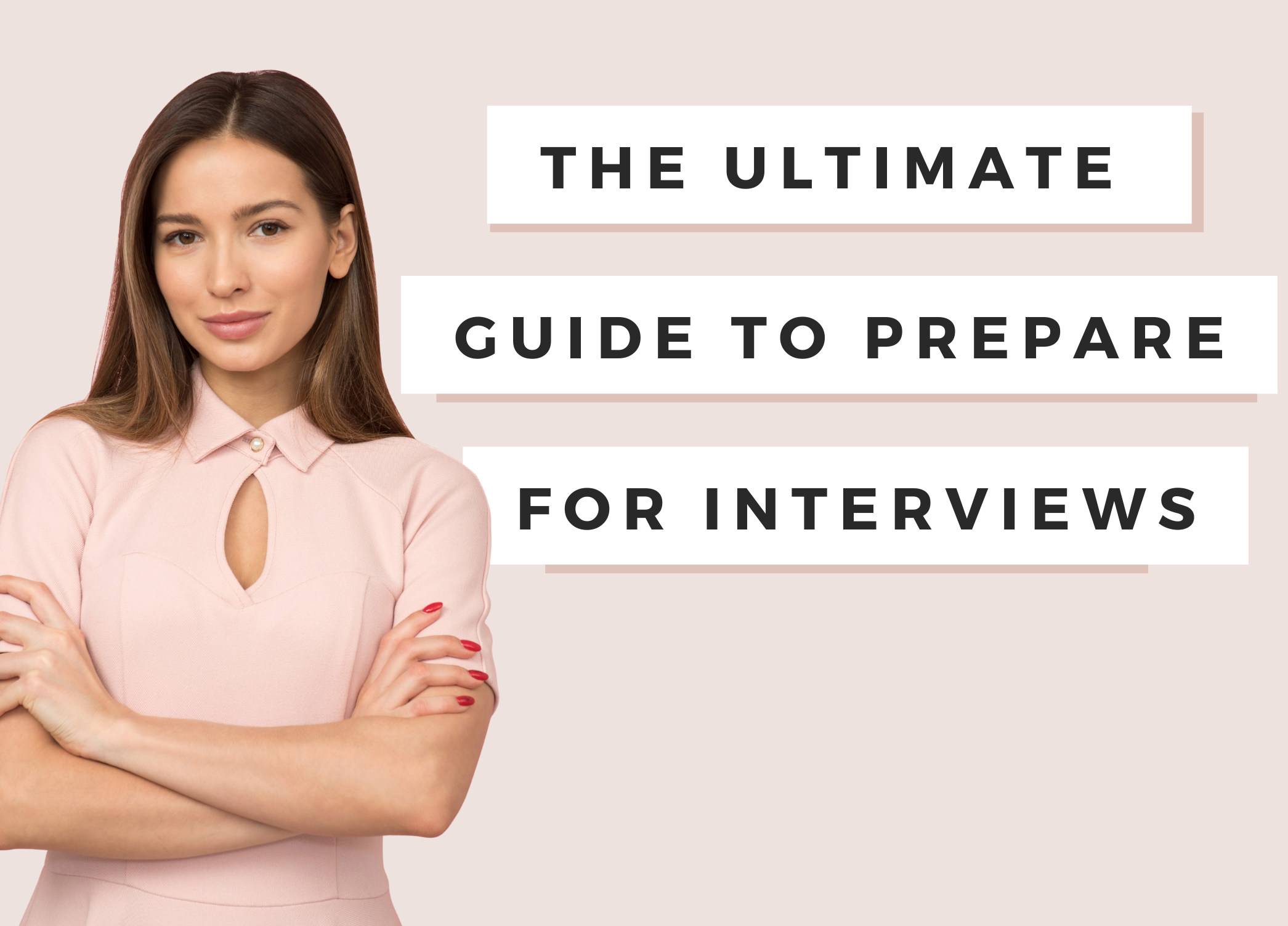Whether you’re gearing up to apply for your next job or just booked an interview, this article will teach you everything you need to know in order to land that next job!
After completing the steps below you’ll feel more comfortable and confident going to meet with your potential employer. Don’t forget to leave yourself as much time to prepare as possible so that you’re not scrambling to put everything together last minute. That way, you’ll walk in empowered and you’ll come across as prepared too.
Alright, let’s dive in!
1. Research The Organization
The first thing you should do to prep for an interview is to research the company.
The best way to become familiar with an organization is to read through their website. Take some time to familiarize yourself with their values, the services they offer, and their background on why the business was launched in the first place. Read through their ‘about us’ page, their mission statement, and anything else you can find on their site that tells you more about what they do and why.
If they have testimonials on their site, read through those as well to see what their customers have to say about them. Another good place to look for client feedback is Google reviews and Glassdoor.com.
Once you’ve spent some time getting to know more about the organization and what they do, you can move on to the next step!
2. Prepare Answers to Common Questions
Regardless of what vocation you work in – whether that’s IT, HR, Sales, Retail, or something else – you will be asked behavioral questions during your interview. The reason being is the potential employer wants to gauge if you’re a right cultural fit for their organization. So, it’s best to have answers prepared and rehearsed so you don’t have to think about how to craft a response on the spot. This will help you feel more confident during the interview.
Start off by writing your answers to the questions below and spend some time thinking through the answers to each scenario. It’s important to write out the answers to each question so you can craft your responses from your unique experience.
Before you get started writing your answers, you need to be aware of the STAR method. The STAR method is a structured manner of responding to behavioral-based interview questions by discussing the specific situation, task, action, and result of the situation you are describing.
- Situation: Describe the situation that you were in or the task that you needed to accomplish. Describe a specific event or situation, not a generalized description of what you have done in the past. Provide enough detail for the interviewer to understand. The situation can be from a previous job, from a volunteer experience, or any relevant event.
- Task: What goal were you working toward?
- Action: Describe the actions you took to address the situation with an appropriate amount of detail and keep the focus on YOU. What specific steps did you take and what was your particular contribution? Be careful that you don’t describe what the team or group did when talking about a project, but what you actually did. Use the word “I,” not “we” when describing actions.
- Result: Describe the outcome of your actions and don’t be shy about taking credit for your behavior. What happened? How did the event end? What did you accomplish? What did you learn? Make sure your answer contains multiple positive results.
Ensure you follow all parts of the STAR method while answering your questions. Be as specific as possible at all times, without rambling or including too much information. Also, eliminate any examples that do not paint you in a positive light. However, keep in mind that some examples that have a negative result (such as “lost the game”) can highlight your strengths in the face of adversity.
Here’s a list of questions you can use as a launch point.
- Tell me about yourself
- Why do you want to work for ABC Company?
- What skills, qualities, and attributes do you have that will be a match for this role?
- Tell us about a time you went above and beyond for a customer.
- Tell us about a challenge you faced and how to dealt with it.
- Can you describe a stressful situation and how you handled it?
- Can you give me an example of when you worked really hard under pressure?
- Can you give an example of how you’ve dealt with conflict in the workplace?
- Can you tell me about a mistake you made at work and how you handled it?
- Can you tell me about a time you had to deal with an irate customer or client?
Once you’ve gotten your answers written down, practice saying them out loud 1-2 times a day until the interview so you’re comfortable with how you’ll answer the questions. Once you have that ready to go, it’s time to move on to the next step.
3. Find Job Role Questions
The next step is to prepare responses to questions for your particular job role. These are questions specific to your industry, position, and experience. For example, I work in IT so when I prep for interviews, I review technical questions about troubleshooting systems and applications. I also take time to refresh myself on topics like Linux commands and how authentication works with single sign-on.
The best way to find these interview questions is on Glassdoor.com. Find the company you’re meeting with, then click on the Interview tab. Search for the name of the position you’re applying to and read the reviews. You’ll find tons of questions that were asked from people who previously interviewed for the same position at the same company.
If you’re meeting with a small company without a lot of reviews, try searching for a larger company in the same sector to get an idea of what they commonly ask their interviewees.
During your research, you’ll notice that some comments in the Interview section also tell you about the interview process itself too. For example, the comment may break down the structure of the interview or provide other useful information (e.g., 15 minutes were spent on introductions & behavioral questions and 45 minutes on technical questions). I recommend that you spend at least an hour reading through the comments, brushing up on topics or programs mentioned, and picking 3-5 questions to prepare answers to.
Another great way to find common interview questions is by searching on YouTube. This will offer another perspective and some videos are filmed directly by recruiters themselves.
Once you find the questions you’re going to prepare the answers to start writing your answers down.
4. Prepare Your Questions
At the end of the interview, the hiring manager will ask you if you have any questions you would like to ask. The only correct answer to this is YES.
I recommend having two or three questions prepared to ask in case nothing comes to mind during the interview itself. You ALWAYS want to ask a few questions at the end of an interview.
However, it’s important not to ask questions you can easily find the answer to on their website or a quick google search. Check out my article on 12 questions you can ask at the end of your interview for ideas.
Once you ask your questions, I highly recommend requesting feedback on how you can improve next time. You can say something along the lines of, “Can you provide me with feedback on how I can improve going forward?”
They may give you constructive criticism or they may applaud you for a job well done. I’ve even had interviewers tell me that I seemed very prepared, so you may get that as feedback as well. How ever they choose to answer, listen closely and apply their feedback in interviews moving forward.
After that, thank them for their time and consideration. Then applaud yourself for a job well done!
5. The Day Before the Interview
Tomorrow’s the big day and it’s time to put everything together. You’ve done all the prep work and now you need to get your finishing touches on everything.
Start off by reading the answers you’ve prepared out loud a few times. You can repeat this step the morning of your interview as well.
Next, set your alarm to wake up earlier than normal. Leave yourself at least 30 minutes more time than usual to get ready. You don’t want to rush the day of your interview. It’s best to leave yourself extra time so you can spend time getting ready, having breakfast, and maybe even getting in a quick walk or workout to boost your energy.
Third, map out your route and plan to arrive at least 15 minutes early. That way, you’ll arrive on time even if there’s an accident or you have a hard time finding parking. You want things to be as smooth as possible so it’s best to plan on getting there early. First impressions matter and if you arrive late, they may not take you as a serious candidate.
Next, pick out your outfit, jewelry, and socks the night before. This prevents wasted time and energy trying on a bunch of clothes in the morning. Iron your outfit then hang it up so it’s easy to find.
Finally, get a good night’s sleep. Try going to bed earlier than normal so you have more time to rest and recharge before the big day.
One final note. Once you arrive at the interview destination, take 2-3 minutes to hype yourself up! Remind yourself that you landed this interview because you’re a great candidate for the job and that your preparation is going to help you have a great interview!!
Conclusion
All in all, preparing for an interview is a lot of work! You must spend time researching the company, preparing your answers, and getting your questions together too. All of this can take time so it’s always a good idea to start preparing as early as possible.
Once you get all of that together, make sure you practice saying your answers out loud each day leading up to the interview. That way, it’s ingrained into your mind and you don’t need to put a lot of thought into it during the interview.
Finally, set yourself up for success the night before by choosing your outfit, mapping out the best route, and going to bed early for a good night’s rest. You got this interview for a reason and you’re going to do great!
If you found this article helpful, leave a comment or share this with a friend!




